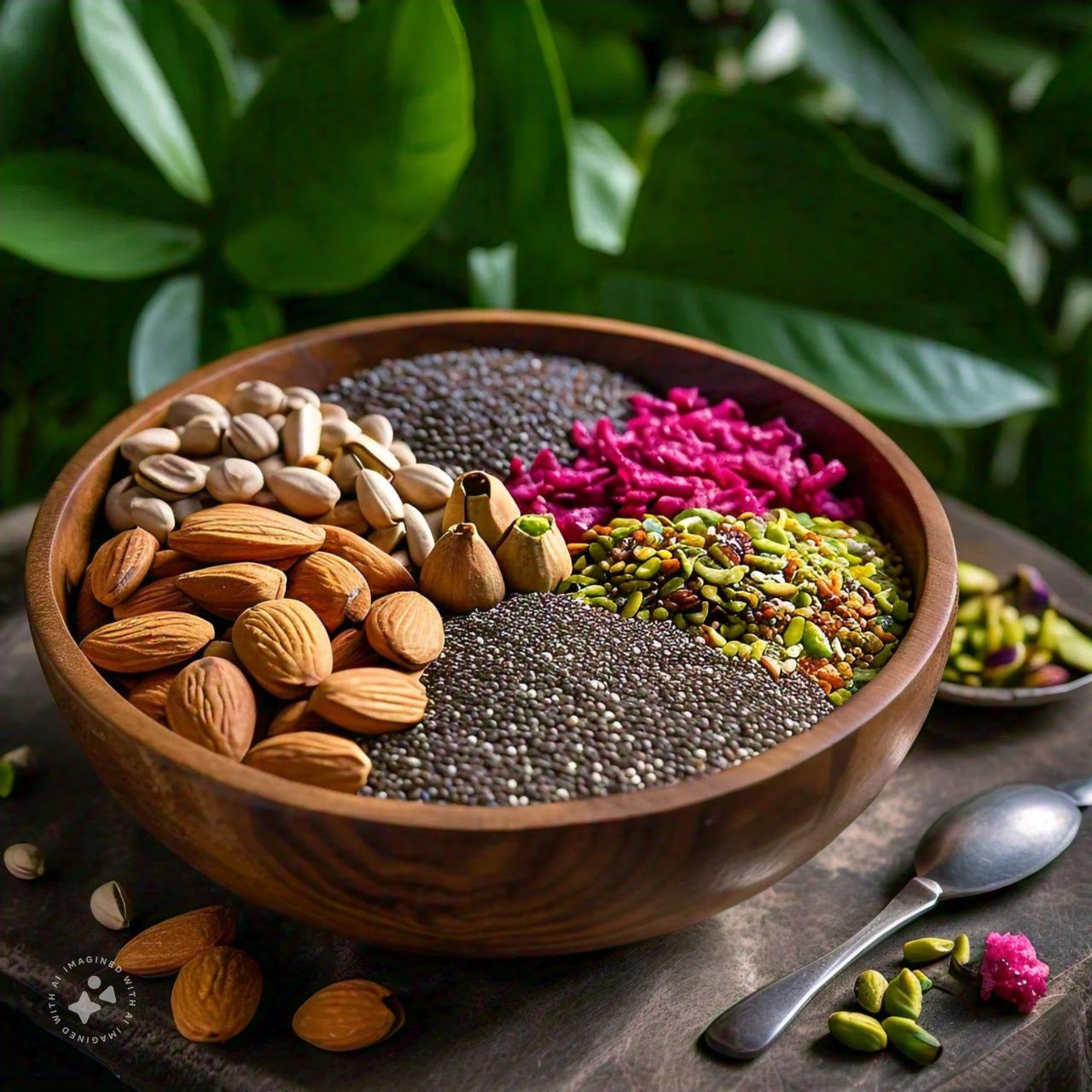Managing blood sugar levels is crucial for maintaining overall health, particularly for individuals with diabetes or those at risk of developing it. While many foods can cause spikes in blood glucose, certain nuts and seeds have been shown to stabilize and reduce blood sugar levels due to their rich nutrient profile. These power-packed snacks are delicious and filled with fiber, healthy fats, protein, and essential micronutrients, all of which play a role in blood sugar regulation. Below, we explore five of the best nuts and seeds that can help you maintain healthy blood sugar levels.
1. Almonds: A Nutritional Powerhouse for Blood Sugar Control

Almonds are an incredibly versatile nut that offers a wide range of health benefits, particularly for blood sugar control. They are rich in magnesium, a mineral that has been shown to improve insulin sensitivity. Many people with diabetes are magnesium-deficient, and adding almonds to your diet can help address this deficiency.
Additionally, almonds are high in monounsaturated fats and fiber, both of which help to slow the release of sugar into the bloodstream. This means that they can help prevent the blood sugar spikes that are common after meals. Consuming almonds regularly has been linked to lower fasting blood sugar levels and improved HbA1c levels, a marker used to monitor long-term glucose control.
Tip: A handful of almonds as a snack or sprinkled on salads can make a big difference in your blood sugar regulation. You can also opt for almond butter as a delicious, spreadable option on whole-grain bread.
2. Walnuts: Rich in Omega-3 Fatty Acids for Better Insulin Sensitivity

Walnuts are well-known for their heart-healthy benefits, but they are also an excellent choice for people looking to stabilize blood sugar levels. Walnuts are packed with omega-3 fatty acids, specifically alpha-linolenic acid (ALA), which has been shown to improve insulin sensitivity and reduce inflammation—both critical factors in diabetes management.
Moreover, the fiber and protein content in walnuts contribute to the slowing down of sugar absorption into the bloodstream. Including walnuts in your diet can lead to better postprandial blood glucose control, meaning they help manage the blood sugar spikes that occur after eating.
Tip: Enjoy a serving of walnuts with yogurt or oatmeal for a healthy, blood sugar-friendly breakfast. Walnuts can also be a great addition to smoothies or even eaten as a standalone snack.
3. Chia Seeds: Fiber-Rich Seeds to Help Lower Blood Sugar Spikes

Chia seeds may be tiny, but they are incredibly powerful when it comes to blood sugar management. These seeds are packed with soluble fiber, which forms a gel-like substance in your stomach. This fiber slows the absorption of sugars into the bloodstream, helping to maintain steady blood sugar levels after meals.
Chia seeds also contain omega-3 fatty acids and antioxidants, which further contribute to improved insulin sensitivity and reduced oxidative stress, a condition often exacerbated by high blood sugar levels.
Because of their neutral taste and ability to absorb liquid, chia seeds are easy to incorporate into a variety of meals. They can be added to smoothies, sprinkled over yogurt, or used in chia puddings for a nutritious dessert.
Tip: Add chia seeds to your morning smoothie or stir them into overnight oats for a simple way to boost your fiber intake. You can also mix them into water or juice to create a refreshing, blood-sugar-friendly drink.
4. Flaxseeds: High in Lignans and Fiber for Improved Glucose Control

Flaxseeds are another fiber-packed seed that can significantly help with blood sugar control. They are rich in lignans, an antioxidant that has been shown to improve glucose tolerance. In addition, flaxseeds contain mucilage fiber, which helps to slow digestion and regulate blood sugar levels by delaying glucose absorption into the bloodstream.
Flaxseeds also offer omega-3 fatty acids, which help reduce inflammation and improve insulin sensitivity. Studies have found that people who consume flaxseeds regularly tend to have lower blood sugar levels and reduced HbA1c values.
Tip: Ground flaxseeds are more easily absorbed than whole flaxseeds, so be sure to grind them before consuming. Add ground flaxseeds to your smoothies, cereals, or baked goods to help stabilize your blood sugar. Know more: https://theaspectratio.in/health-fitness/new-lancet-study-exposes-indias-micronutrient-deficiency-epidemic-are-you-at-risk/
5. Pistachios: A Balanced Snack for Sustained Energy and Blood Sugar Control

Pistachios are delicious and loaded with nutrients that support blood sugar control. They contain a good balance of carbohydrates, protein, and healthy fats, which makes them an ideal snack for maintaining stable blood sugar levels throughout the day.
A study published in the Journal of the American College of Nutrition found that pistachios can reduce postprandial glucose levels in individuals with type 2 diabetes. Their high fiber and arginine content helps improve insulin sensitivity and lower the body’s insulin requirements.
The key benefit of pistachios is that they can help prevent the rapid increase in blood sugar that typically follows carbohydrate-heavy meals. By incorporating them into your diet, you can enjoy more stable energy levels and better overall glycemic control.
Tip: Snack on pistachios in between meals or mix them into a trail mix with other blood sugar-friendly nuts and seeds. You can also use pistachios as a topping for your salads or roasted vegetables for an extra crunch.
Conclusion: Supporting Blood Sugar Levels with Nutrient-Dense Nuts and Seeds
Incorporating these nutrient-dense nuts and seeds into your daily diet can help regulate blood sugar levels, improve insulin sensitivity, and provide essential nutrients for overall health. Whether you’re living with diabetes or simply aiming to maintain balanced glucose levels, these five foods—almonds, walnuts, chia seeds, flaxseeds, and pistachios—offer a delicious and practical way to support your goals. By focusing on whole, unprocessed forms of these nuts and seeds, you’ll not only improve your blood sugar control but also enhance your overall health and well-being.
For sustained benefits, it’s important to consume these foods in moderation, while maintaining a balanced diet and engaging in regular physical activity.



 By
By









 By
By







